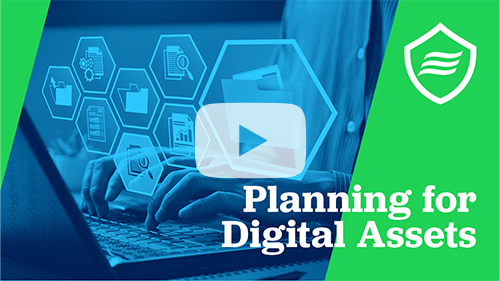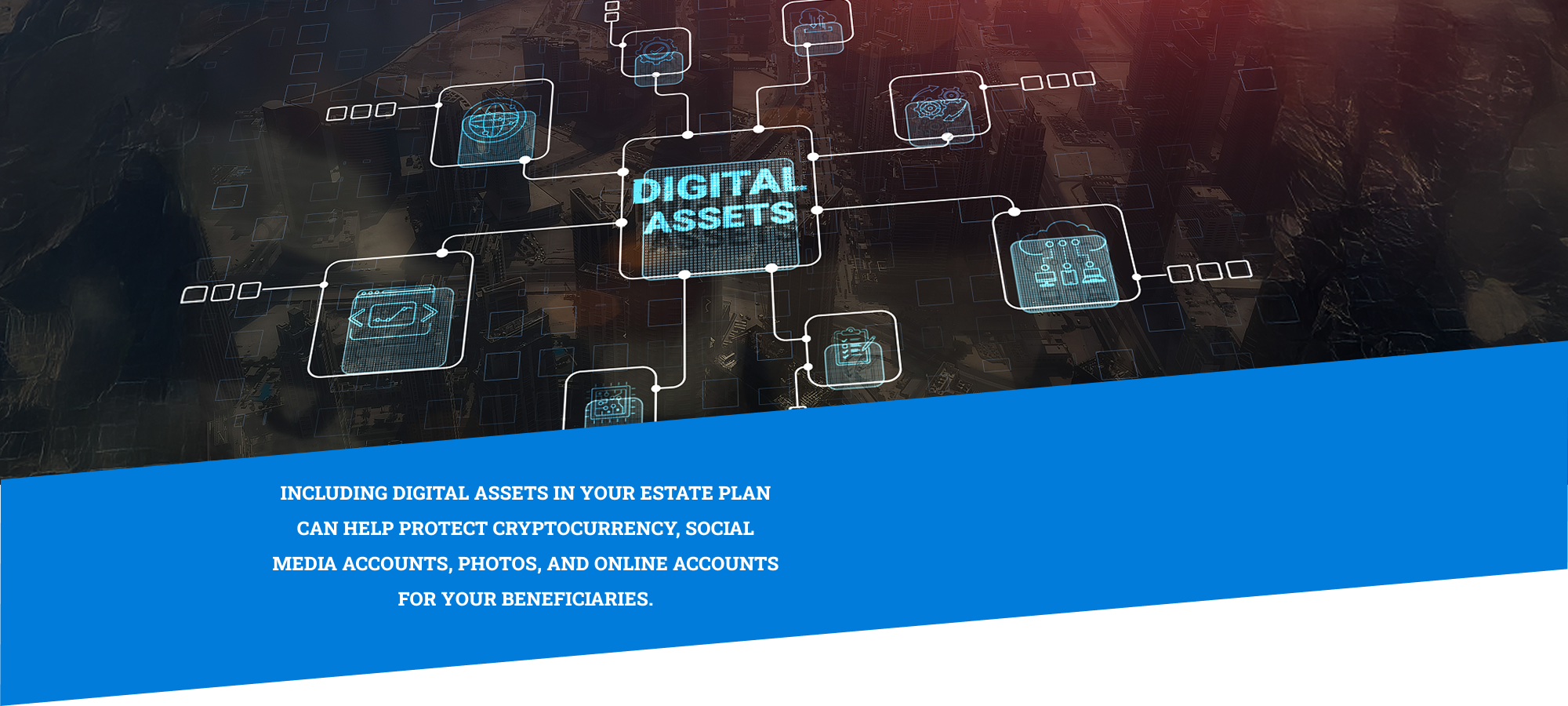DIGITAL ASSETS IN ESTATE PLANNING
Protect Your Online Legacy
Including digital assets in your estate plan can help protect cryptocurrency, social media accounts, photos, and online accounts for your beneficiaries.

What Are Digital Assets?
Digital assets include everything you own online: photos, emails, cryptocurrency, social media accounts, and online banking. These digital holdings are becoming as valuable as physical property and require the same level of estate planning attention.
Your digital footprint likely extends far beyond basic computer files. Cryptocurrency holdings, business accounts, cloud-stored photos, and social media profiles all represent significant personal and financial value that should be included in your estate plan.
The challenge is accessibility. Without proper planning, your family may be unable to access these assets after your death. Precious memories, valuable investments, or important documents could be permanently lost simply due to unknown passwords or security barriers. Digital asset planning ensures your online legacy remains accessible to your loved ones.

Types of Digital Assets in Estate Planning
Digital assets fall into four main categories. Understanding these classifications helps ensure comprehensive estate planning coverage:
Financial Digital Assets:
- Cryptocurrency wallets and exchange accounts
- Online banking and investment platform access
- Digital payment systems (PayPal, Venmo, Apple Pay)
- Online brokerage and retirement accounts
- Digital wallet applications and stored value

Digital Content and Intellectual Property:
- Blogs, websites, and online publications
- Digital art, photography, and creative works
- Music collections and compositions
- E-books, online courses, and educational content
- Revenue-generating digital products and licensing
Business Digital Assets:
- Domain names and website properties
- Online business accounts and platforms
- Digital marketing assets and campaigns
- Client databases and customer information
- Software licenses and subscription services

Personal Digital Assets:
- Digital photo and video collections
- Email archives and personal correspondence
- Social media profiles and content
- Personal documents stored in cloud services
- Digital music and entertainment libraries
Estate Planning Challenges with Digital Assets
Digital asset estate planning presents unique challenges that traditional estate planning methods were not designed to address.
Access and authentication create the primary obstacles. Security measures like passwords, two-factor authentication, and biometric verification protect your accounts during your lifetime but can prevent necessary access for estate administration. When authentication apps are locked on personal devices, accounts may become permanently inaccessible.
Legal and platform restrictions add complexity. Many service providers prohibit password sharing, even with family members, and platform terms of service often supersede traditional inheritance directives. Additionally, automatic account deletion policies can result in permanent asset loss if families do not act within specified timeframes.
Jurisdictional complications further complicate matters. State laws governing digital asset inheritance vary significantly, and assets stored on international servers may be subject to foreign regulations that conflict with domestic estate planning documents.

Digital Asset Planning Strategies
Begin with a comprehensive digital asset inventory that catalogs all online accounts, digital files, cryptocurrency holdings, and subscription services. Include estimated values and access requirements for each asset. Organizing assets by category makes the information more manageable for executors and beneficiaries. Secure credential sharing requires careful planning. Password managers with emergency access features allow you to designate trusted contacts who can request access under specific circumstances while maintaining security during your lifetime. However, two-factor authentication apps present ongoing challenges since they typically require access to your personal devices.
Implement multiple backup strategies to ensure asset accessibility. Store important files in various locations, including cloud storage and external drives. Consider which assets require immediate access for estate administration, such as business accounts or bill-paying services that cannot wait for lengthy probate procedures.
Cryptocurrency and Digital Currency Planning
Cryptocurrency inheritance requires specialized planning due to unique storage and access characteristics. Whether held on exchanges, in software wallets, or hardware devices, each storage method presents distinct challenges for beneficiary access and estate administration.
Hardware wallets provide excellent security but create inheritance challenges if recovery phrases are not properly shared. Without access to recovery phrases, cryptocurrency holdings can be permanently lost.
Tax implications must be considered in cryptocurrency estate planning. Holdings are subject to estate taxes based on fair market value at death, and beneficiaries may face additional income tax consequences upon sale or use.
Professional Digital Asset Management
Professional digital asset management services can provide comprehensive assistance with organizing and maintaining digital estate plans as technology evolves. These specialists offer inventory assistance, secure storage solutions, and ongoing management for families.
Working with estate planning attorneys experienced in digital assets is also advisable. Legal professionals can help navigate complex regulations and ensure that your digital asset plan integrates properly with your overall estate planning strategy.
Implementation Strategies
Effective implementation requires balancing security with accessibility for your family. Maintain clear, current documentation that executors and beneficiaries can easily understand and follow.
Communication with family members about digital asset planning ensures everyone understands their roles and responsibilities. Regular testing of your access plans helps identify potential issues before they become critical problems during estate administration.
Frequently Asked Questions
Q: What happens to my social media accounts when I die?
Platform policies vary significantly. Facebook and Instagram offer memorial account options for families, while Twitter permanently suspends deceased users' accounts. Most major platforms provide some form of posthumous account management, but specific procedures and requirements differ by service.
Q: How do I safely share digital asset passwords with my executor?
Password managers with emergency access features allow you to designate trusted contacts who can request access when needed. Alternative methods include sealed instructions stored with estate planning documents or specialized digital asset management services that handle secure credential sharing.
Q: Can my family access my cloud storage accounts after I die?
Access depends on the service provider's policies and your state's digital asset laws. Some providers like Google and Apple offer legacy contact features, while others may require court orders or specific legal procedures. Review your provider's posthumous access policies and establish legacy contacts where available.
Q: What digital assets are most commonly overlooked in estate planning?
Commonly overlooked assets include subscription services, loyalty program points, photo collections across multiple platforms, online business accounts, and cryptocurrency holdings. Creating a comprehensive inventory is essential because most people underestimate the extent of their digital asset portfolio.
Q: How often should I update my digital asset inventory?
Digital asset inventories should be reviewed annually or when significant changes occur in your digital portfolio. New accounts, service closures, password updates, and security modifications all warrant inventory updates to maintain accuracy.
Q: Do I need special legal documents for digital asset planning?
General estate planning documents can address digital assets, but specific digital asset provisions may provide additional clarity and protection. Some states offer specialized digital asset forms, and certain platforms require specific authorization documents for posthumous access.
Q: How do digital asset laws vary between states?
Digital asset laws vary considerably between states. Some have adopted comprehensive frameworks while others provide limited guidance. Many states have implemented versions of the Revised Uniform Fiduciary Access to Digital Assets Act, though specific provisions and procedures differ by jurisdiction







Social Media and Personal Digital Legacy
Social media accounts contain years of personal history and memories that families often wish to preserve. Each platform has different policies for deceased users' accounts. While some services offer memorial account options, others may delete accounts entirely. Understanding platform-specific procedures helps families make informed decisions about memorialization.
Major platforms typically offer memorial account options that preserve memories while preventing unauthorized access. However, digital photo and video collections are often distributed across multiple platforms and devices, requiring comprehensive planning to ensure family access to important memories.
Email archives and digital communications may contain important information for estate administration or hold significant sentimental value for family members. However, planning for access to these communications requires balancing estate needs with privacy considerations.